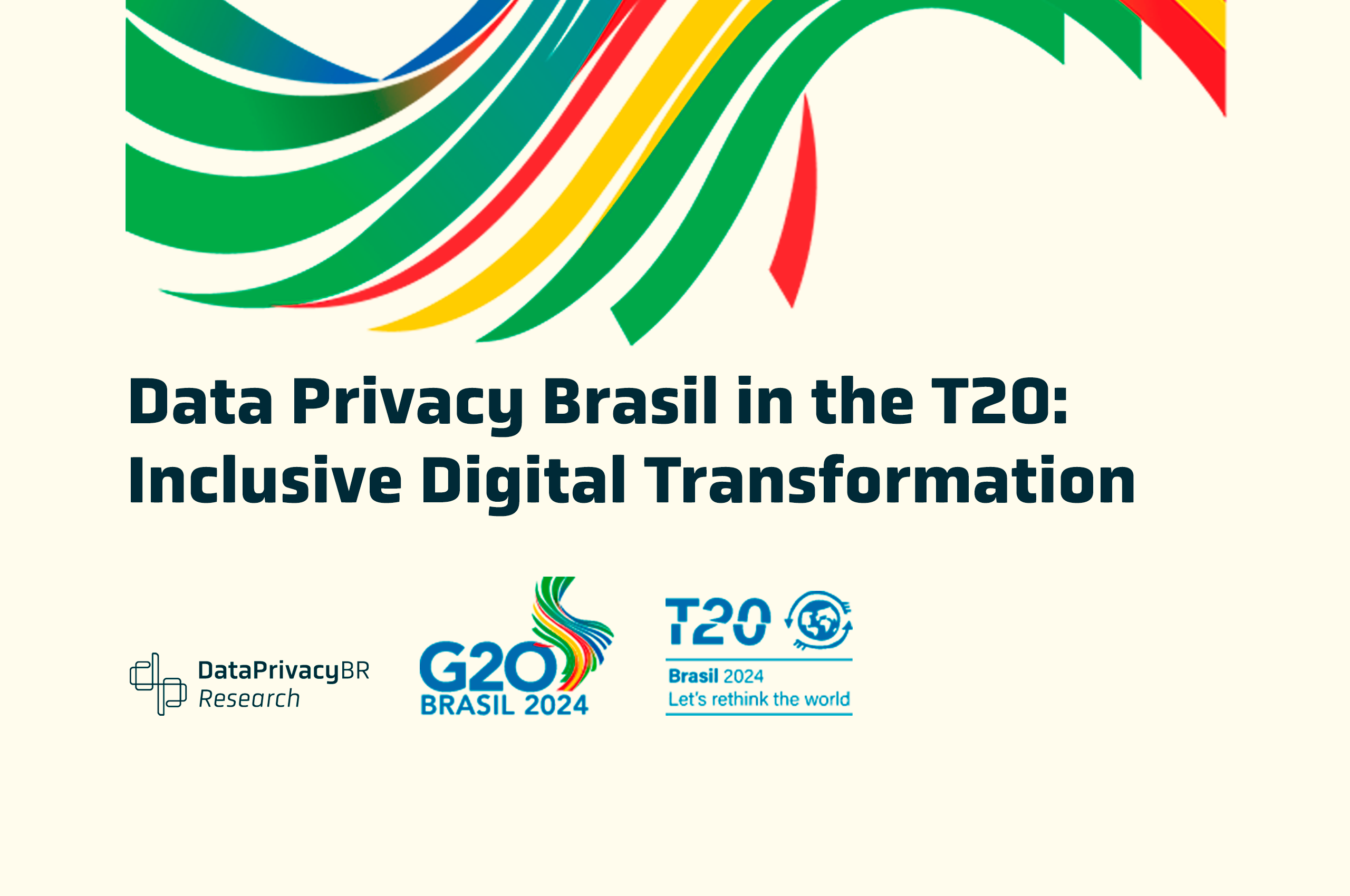Governance and Regulation
Data Privacy Brasil in the T20: Inclusive Digital Transformation
Objective: To assist in coordinating Task Force 5 "Inclusive Digital Transformation" within the G20 Think Tanks Engagement Group (T20), which was under Brazil’s presidency in 2024; to promote the participation of Global South think tanks on an equal footing with Global North think tanks in the G20 process.
Duration: 2024 -
Status: Em Andamento
Supporter(s):
Description
The Group of 20, also known as the G20, is one of the main forums for global economic cooperation, playing a crucial role in addressing major global socio-economic issues. The G20 is composed of 19 countries and two regional bodies (the African Union and the European Union). One of its key strengths lies in its multi-stakeholder composition for discussions, extending beyond member states, which reflects the multifaceted nature of global challenges.
The G20 process includes engagement groups that allow direct participation from various sectors of society, beyond the official involvement of governments. In this context, several groups focus on specific topics through the perspectives of different sectors. One example is the Think Tank 20 (T20), the engagement group aimed at think tanks and research centers. During Brazil’s G20 presidency, the T20 was coordinated by a triad of institutions: the Brazilian Center for International Relations (CEBRI), the Institute for Applied Economic Research (IPEA), and the Alexandre de Gusmão Foundation (FUNAG).
Each engagement group has thematic Task Forces that tackle specific issues related to their area of focus. In the case of the T20, there were six Task Forces: 1. Fighting Inequality, Poverty, and Hunger; 2. Sustainable Climate Action and Just, Inclusive Energy Transitions; 3. Reforming the International Financial Architecture; 4. Trade and Investment for Sustainable and Inclusive Growth; 5. Inclusive Digital Transformation; 6. Strengthening Multilateralism and Global Governance.
Each Task Force is coordinated by representatives from think tanks or research centers. Data Privacy Brasil was selected, after expressing interest, to co-lead Task Force 5, “Inclusive Digital Transformation,” alongside the Observer Research Foundation (ORF) from India. Our primary role was to foster participation from think tanks and research centers in the T20 process, promoting in-depth discussions on topics related to inclusive digital transformation.
Although this initiative was mainly concentrated in the Governance and Regulation area of Data Privacy Brasil, it represented an institutional role in coordinating Task Force 5, involving both direct and indirect contributions from all other areas within our organization.
The engagement groups’ work resulted in recommendations which were forwarded to the Leaders’ Summit preparations through the Sherpa Track. During Brazil’s G20 presidency, one of the Sherpa Meetings was dedicated exclusively to receiving these recommendations, in time for the ministerial meetings of the working groups within the Sherpa Track, scheduled for July 2024. The T20 recommendations were largely based on policy briefs submitted by think tanks and research centers worldwide, following a call published on the official T20 Brazil website.
The themes addressed during Brazil’s G20 presidency were strongly related to inequalities and power asymmetries, demanding reforms in global governance and rights-centered policies. Therefore, our engagement with T20 Brazil aligned with our strategy to strengthen and promote South-South cooperation, where countries from the Global South can contribute to shaping the international agenda and directing efforts toward more inclusive and dignified technological development and use. At a time when regulations for Artificial Intelligence (AI), platform-based work, and digital public services have been highlighted, we considered that a broad and participatory dialogue from the Global South was essential to seek a more dignified future for our citizens.
The T20 engagement came at a timely moment for Brazil in terms of global governance. The country has taken on multiple leadership roles: beyond the G20 presidency, the BRICS group is expanding, and preparations for the COP30 in Pará in 2025 are already underway. Additionally, Brazil has gained prominence in areas such as AI governance and information integrity, one of the priorities of the Digital Economy Working Group for 2024. These initiatives present numerous opportunities to reflect on digital agenda priorities at both local and global levels, alongside organizations working on these issues, many of which are involved in the T20 process.
We hope that both the work carried out here and the Global South network formed around the G20 can have a lasting impact beyond this institution and Brazil’s presidency, helping to channel resources and attention to other global and local spaces that advocate for rights- and citizenship-based approaches for these populations.

